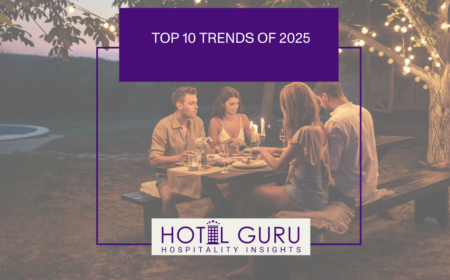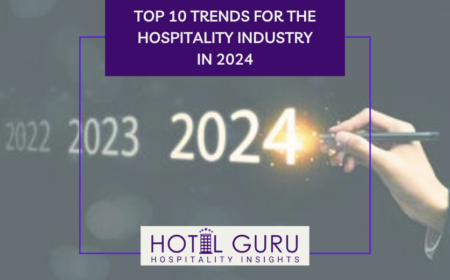Foresight is 20/20
By Robert Rauch and Sarah Andersen
In the new decade, Generation Z will become a new generation of travelers, technology will fuel these travelers, and the AI world is coming whether we like it or not, but its application in hotel operations will support team members rather than replace them.
Here is a full look at the emerging trends for 2020.
CCPA
The California Consumer Privacy Act is a bill anticipated to improve privacy rights and consumer protection for California residents. Similar to the EU’s GDPR, the CCPA will require companies that have at least $25 million in annual revenue to focus on personal user data and provide transparency in how they’re collecting, sharing and using such data. This new law allows any California consumer to demand to see all the information a company has saved on them, as well as a full list of all the third parties that data is shared with.
Digital transformation
Digital transformation is the use of new, fast and frequently changing digital technology to solve problems. These are often implemented by increasing user reliance on subscription-based cloud services. Today, travelers expect relevant content in relation to what they are doing anytime or anywhere.
They also expect content to be available in the format and on the device they desire.
This change is being driven by the guest, so to retain a competitive advantage, hoteliers need to change their business models and create a digital vision of the future.
Artificial intelligence
Artificial intelligence will impact every job and every industry and country. The market is primed for disruption as personalization and AI are being integrated into what will be a new era of tech innovation. With the now exponential growth of workforce automation, some fear that AI will decimate key job sectors and collapse industries altogether. We are seeing major companies, such as Hilton, expand their use of AI into other applications, like digital assistants, for certain processes including feedback and performance reviews.
Hoteliers will continue to use AI to help focus on the needs of both employees and guests. Robots are better at performing routine tasks; however, the hospitality industry is built on the human experience.
Sustainability
The hospitality sector has historically had a dramatic environmental impact through use of consumable and durable goods, energy and water consumption, and solid and hazardous waste creation. Sustainable tourism is no longer a rising travel trend, it is a priority for hospitality leaders and businesses around the world.
Conserving energy is the most economically sustainable method, making it a good place to start. This means redesigning the guest experience to encourage sustainable behavior.
Motion-sensor lighting, communal amenities and water-conscious signage are a few initiatives that can be easily implemented.
Direct bookings
The emergence of online travel agencies such as Expedia and Booking.com have provided travelers with a convenient, cost-effective channel through which to book their hotel. In 2018 and 2019, the industry saw major marketing campaigns from the big brands—especially Marriott and Hilton—to encourage guests to book directly. However, direct bookings, as a percentage, are falling once again, as OTAs rise. Why? Because many hotels haven’t incorporated user-generated content into their branded websites. By integrating reviews and guest pictures directly on their websites, hotels can decrease the chances of visitors returning to the OTAs to finalize their booking.
Recession
The travel industry is directly entwined with global consumption growth, and as wealth and populations continue to grow, demand for hotels will continue to expand. However, with a potential soft landing or recession on the horizon, there will likely be a slight slowdown in domestic travel, notwithstanding the current strength in consumer confidence.
The expected strengthening in international inbound travelers coupled with election-year economics will fill in these gaps. A rising demand for tours to more exotic corners of the globe continues despite other downturns in international travel due to trade tensions.
Cybersecurity
In late 2018, Marriott revealed that a massive cyberattack compromised personal information for up to half a billion individual guests of its properties. In 2017, InterContinental Hotels Group discovered a breach lasting three months and affecting over 1,000 properties. Due to the changing regulatory landscape designed to heighten online responsibility (such as the CCPA), many hoteliers are reconsidering their cybersecurity infrastructure.
Hoteliers looking to implement cybersecurity are facing industry-specific challenges, including high employee turnover. Complicated this challenge is that every property has a massive interconnected digital foundation of HVAC controls, Wi-Fi systems, alarms and electronic doors, all of which provide cybercriminals multiple entry points into a hotel’s network. Hotels need to take proactive measures to detect and respond to cyberattacks as quickly as they occur.
Secondary market development
Over the course of 2019, the industry has seen a regular cadence of monthly and quarterly RevPAR misses and downward revisions to forecasts for the next quarter. At this point, most industry participants believe 2020 RevPAR will finish below current industry forecasts calling for 1% growth, and view flat or slightly positive as a more reasonable target.
As growth decelerates in major U.S. markets, hoteliers and investors will turn their interest to secondary markets. Hotel investment in secondary and tertiary markets across the United States is likely to increase dramatically. These secondary-market hotels have a lot of potential for profit and success due to the minimal competition and reduced expenses.
No more cheap booze
On the food-and-beverage side of the hotel industry, customization is key. From unusual ingredients to unexpected preparation methods and garnishes, people have come to expect a certain level of interaction and entertainment with their craft beer and cocktails. In addition to stocking these high-quality liquors, skilled food and beverage operators have an eye for what beverages succeed on social media, where color is critically important, looking for products that are “Instagram-friendly.”
Generation Z
Industry reports indicate that nearly 40% of Generation Z is planning to visit at least three different continents over the next 10 years. Late Baby Boomers, largely in their 50s, have strong discretionary income and still work full time. Gen Xers, now in their 40s, have strong incomes and high expenses. Millennials now in their 20s and 30s are the big spenders, and Gen Z will start spending as the World War II babies slow their travel.







